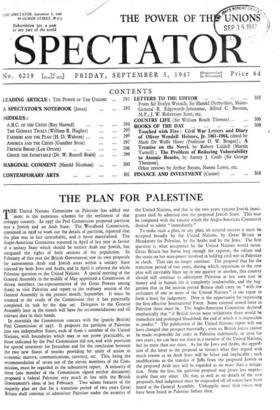THE PLAN FOR PALESTINE
THE United Nations Committee on Palestine has added one more to the numerous schemes for the settlement of that unhappy country. In 1937 the Peel Commission proposed partition into a Jewish and an Arab State. The Woodhead Commission, appointed in 1938 to work out the details of partition, reported that the plan was in fact unworkable, and it never materialised. The Anglo-American Committee reported in April of last year in favour of a unitary State which should be neither Arab nor Jewish, but safeguard the rights of both sections of the population. In February of this year the British Government saw its own proposals for autonomous Arab and Jewish areas within a unitary State rejected by both Jews and Arabs, and in April it referred the whole Palestine question to the United Nations. A special meeting of the General Assembly in the middle of May appointed a Commission of eleven members (no representatives of the Great Powers among them) to visit Palestine and report to the ordinary session of the General Assembly in the present month, September. It must be counted to the credit of the Commission that it has punctually completed its task by the date set. Delegates to the General Assembly later in the month will have the recommendations and all relevant data in their hands.
In essentials the Commission concurs with the (purely British) Peel Commission of 1937. It proposes the partition of Palestine into two independent States, each of them a member of the United Nations, with boundaries which may or not prove practicable, as those indicated by the Peel Commission did not, and with provision for special treatment for Jerusalem and for the conclusion between the two new States of treaties providing for unity of action in economic matters, communications, currency, etc. This, being the recommendation of seven out of the eleven members of the Com- mission, must be regarded as the substantive report. A minority of three (one member of the Commission signed neither document) proposed a federal Palestine very much in line with the British Government's ideas of last February. Two salient features of the majority plan are that for a transition period of two years Great Britain shall continue to administer Palestine under the auspices of
the United Nations, and that in the two years iso,000 Jewish immi- grants shall be admitted into the proposed Jewish State. This may be compared with the too,000 which the Anglo-American Committee desired to admit "immediately."
To make such a plan, or any plan, an assured success it must be accepted broadly by the United Nations, by Great Britain as Mandatory for Palestine, by the Arabs and by the Jews. The first question is what acceptance by the United Nations would mean. Great Britain has borne long enough the expense, the odium and the strain on her man-power involved in holding civil war in Palestine in check. That can no longer continue. The proposal that for the transition period of two years, during which opposition to the new plan will inevitably blaze up in one quarter or another, this country should still continue to administer Palestine at her own cost in money and in human life is completely inadmissible, and the sug- gestion that in the interim period Britain shall carry on "with the assistance of one or more of the United Nations" is too vague to form a basis for judgement. Here is the opportunity for organising the first effective International Force. Some external armed force in Palestine there must be. The Anglo-American Committee declared emphatically that "if British forces were withdrawn there would be immediate and prolonged bloodshed, the end of which it is impossible to predict." The publication of the United Nations report will not have changed that prospect materially ; even so, British forces cannot be made responsible for order in Palestine indefinitely, or even for two years ; we can bear our share as a member of the United Nations, but no more than our share. As for the Jews and Arabs, the opposi- tion of the latter to the proposal to vivisect what they regard with much reason as an Arab State will be bitter and implacable ; such modifications as the transfer of Jaffa from the proposed Jewish to the proposed Arab area will be regarded as no more than a mitiga- tion. None the less, the partition proposal may prove less imprac- ticable than any other. On that, as well as on details of the new proposals, final judgement must be suspended till all voices have been heard at the General Assembly. Unhappily, more than voices may have been heard in Palestine before then.


































